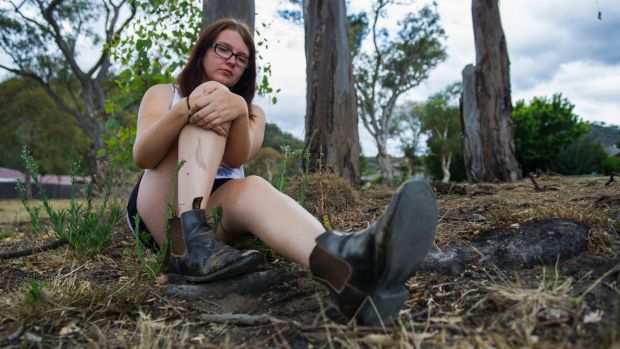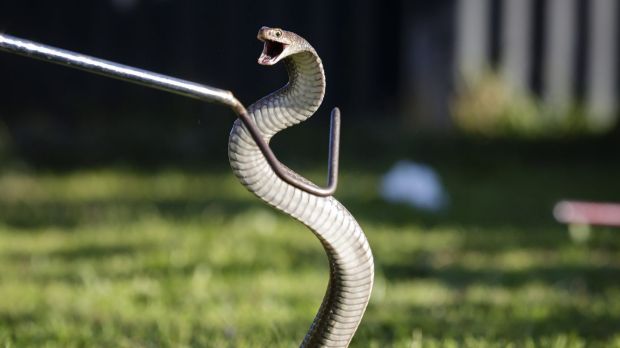Veterinary nurse Tayla Ballard is extremely lucky after her close call with an eastern brown snake, with experts reminding Canberrans how to stay safe from the predators this summer.
Ms Ballard was in a Kambah paddock before work on Monday afternoon feeding her horses.

"My mare was acting a bit strange," Ms Ballard said.
"She was standing in weeds and I thought maybe she had something stuck in her foot."

When Ms Ballard bent down in the weeds to check, she felt a sharp pain on her calf and turned to see the snake rearing up before it slithered off.
"When I realised what happened I sat in my car and called Triple 0," she said.
"I was very frightened, I knew that I just had to stay calm though."
Ms Ballard knew what to do when you're bitten by a snake: compress the wound, wind a tight bandage down to the end of the extremity and then wind it back up.

"When paramedics showed up they did a better compression bandage," she said.
She was in a hospital in 15 minutes, and doctors kept her there until after midnight despite a venom detection kit saying the snake had only given her a "dry bite", not injecting any venom.
"He was just doing what his instinct was telling him, I don't have a problem personally with snakes," she said.
Emma Carlson from Canberra Snake Rescue and Relocation said snakes would try to avoid biting you if they could.
"Their venom is meant for prey, it's not actually for a defensive thing really," Ms Carlson said.
Ms Ballard said the snake that bit her was a familiar sight in the paddock and was normally quite aggressive. Ms Carlson said snakes each had their own personality and some could be calmer.
Ms Carlson pointed out brown snakes would often hiss or flatten themselves, as the first warning, before they reared up, giving a final warning they could bite someone.
"If you do see one, do not panic. Allow them to have their space," she said.
"They'll see you coming and they'll go 'nope'."
But she warned they were still extremely dangerous animals and their venom could be fatal.
"They can kill several adults with one bite," she said.
She suggested not bushwalking with headphones in and wearing appropriate clothing, like boots and pants.
Snakes drink from low lying water sources like ponds or ground-level bird baths.
Ms Carlson said her business was busy, with most call outs in the late afternoon, especially on hot days
Snakes on hot days would mainly be active during the morning and dusk, the cooler parts of the day.
The ACT government's Environment, Planning and Sustainable Development Directorate said there had been 24 snake jobs between November 1 and January 3, marking a slight increase from 20 it had during a similar period last summer.
"The best advice we have is to leave snakes alone," it said.
"If they are in your yard they are generally just passing through. Move pets and children away for an hour or so until the snake moves off."
"You can reduce the chance of snakes staying on or returning by keeping your lawns and gardens maintained, storing wood piles off the ground, ensuring pet food and water bowls are not accessible and enclosing compost heaps to reduce mouse populations, which are a food source for snakes."
Snake advice from TCCS on Vimeo.